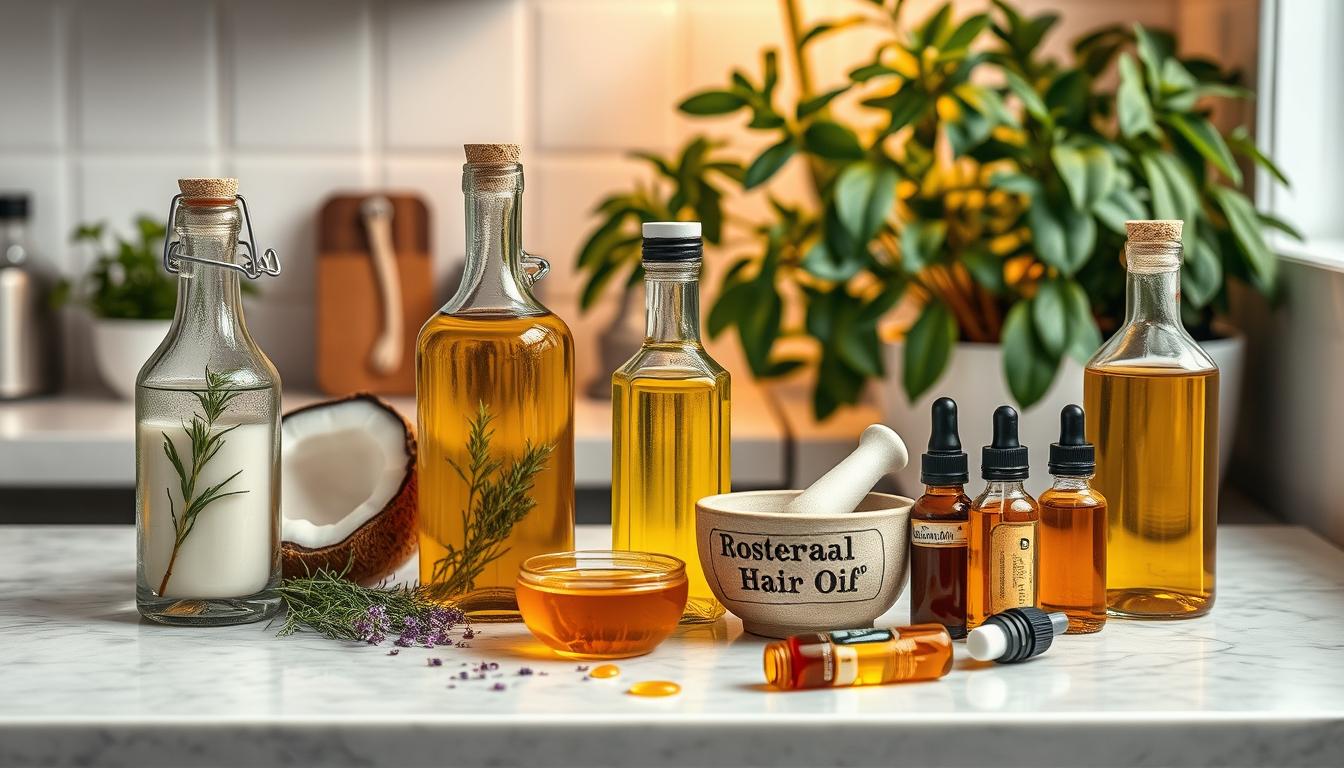Are you ready to transform your hair care routine with a touch of DIY magic? Making your homemade hair oil can be both a rewarding and therapeutic experience. By delving into the world of natural ingredients, you can customize a blend that perfectly caters to your hair type and specific needs. This guide is designed to empower you with the skills and knowledge to create a potent, effective hair oil that promotes healthy hair.
From selecting the ideal natural carrier oils to incorporating beneficial essential oils, you’ll find that the process is simpler than you might think. Say goodbye to mass-produced products and hello to a personalized approach that puts you in control. As you begin this journey into DIY hair care, you’ll discover the joy of using pure, natural ingredients to achieve luscious, healthy hair.
Key Takeaways
- Creating homemade hair oil is a rewarding and therapeutic experience.
- Using natural ingredients allows for a personalized touch in your hair care routine.
- Customizing your hair oil blend can address specific hair needs effectively.
- Embracing DIY hair care puts you in control of what you put on your hair.
- The process is simpler than you might expect and promotes healthy hair.
Benefits of Homemade Hair Oil
Embracing homemade hair oil offers numerous advantages that cater to various hair care needs. This oil isn’t just a simple blend; it’s a cornerstone for achieving optimal hair health. Let’s delve into the primary benefits associated with using homemade hair oil, focusing on scalp nourishment, hair growth, and enhancements in hair strength and shine.
Nourishment for Your Scalp
Homemade hair oil delivers profound scalp nourishment, helping to maintain a balanced and healthy scalp environment. This personalized concoction can alleviate dryness, reduce irritation, and provide the essential moisture your scalp craves. Properly nourished scalps are fundamental to sustaining overall hair health and setting the stage for robust hair growth.
Enhancing Hair Growth
One of the most sought-after homemade hair oil benefits is its potential to stimulate hair growth. Tailored to your unique needs, these oils can penetrate deep into the scalp, promoting better blood circulation and delivering key nutrients directly to hair follicles. When your follicles are well-fed, hair growth becomes more vigorous and consistent.
Improving Hair Strength and Shine
Regular application of homemade hair oil can significantly improve hair strength and boost shine enhancement. The natural ingredients within these oils fortify your hair from the roots to the tips, minimizing breakage and giving your locks a resilient and glossy finish. By weaving this practice into your routine, you’ll experience the powerful cumulative effect of enhanced hair strength and luster.
Essential Ingredients for Making Hair Oil
Creating your own hair oil at home involves combining various natural ingredients that benefit your hair. In this section, we will explore natural carrier oils, beneficial essential oils, and herbal additions that can transform your hair care routine naturally.
Natural Carrier Oils
Natural carrier oils serve as the base for your homemade hair oil. They help dilute essential oils and carry them onto your hair and scalp. Popular options include coconut oil, known for its deep conditioning properties, argan oil, which is rich in antioxidants, and jojoba oil that’s great for balancing oil production. Each carrier oil brings its unique set of benefits, enhancing the overall effectiveness of your hair oil blend.
Beneficial Essential Oils
Essential oils add a potent punch to your homemade hair oil. Lavender oil is renowned for calming the scalp and promoting hair growth. Rosemary oil can help improve circulation and stimulate hair follicles, while tea tree oil is excellent for combating dandruff and maintaining scalp health. Using essential oils in your hair oil blend ensures that your hair receives all the advantages of these natural ingredients.
Herbal Additions
Incorporating herbal remedies into your hair oil mix can provide additional benefits and elevate your hair care routine. Herbal additions like fenugreek, which strengthens hair and combats hair loss, and amla, known for its high vitamin C content and antioxidant properties, can make a significant difference. These herbs can be infused into your oil or added separately to reinforce the wholesome nature of your hair oil blend.

How to Make Hair Oil? A Step-by-Step Guide
Creating your own hair oil at home is both an empowering and rewarding endeavor. Let’s delve into the process of making hair oil customized to meet your unique hair needs. This step-by-step guide will ensure that your DIY hair care project is a success, from selecting the right oils to using and storing your blend effectively.
Selecting the Right Oils
Before you start the oil blending process, it’s essential to choose oils that cater to your hair type and concerns. Begin with:
- Carrier Oils: These form the base of your hair oil. Popular choices include coconut oil, argan oil, and jojoba oil.
- Essential Oils: These are added in smaller amounts and provide specific benefits, such as lavender for soothing the scalp or rosemary for stimulating hair growth.
Creating Your Oil Blend
Once you have your ingredients, it’s time to blend them. Follow this step-by-step guide:
- Measure out your carrier oil into a clean glass bottle. Depending on your oil selection, use around 4 ounces as a base.
- Add essential oils, typically 10-15 drops per ounce of carrier oil. Mix well to ensure even distribution.
- Shake the bottle gently but thoroughly to blend the oils together.
Storing and Using Your Homemade Hair Oil
Proper storage is crucial to maintain the potency of your homemade hair oil. Here are the steps:
- Store the oil in a cool, dark place to avoid degradation from sunlight and heat.
- Use a dark-colored bottle to protect the oil from light exposure.
For application:
- Apply a small amount to your scalp and hair, focusing on the ends.
- Massage gently to enhance absorption and stimulate the scalp.
- Leave it on for at least an hour, or overnight for deep conditioning, before washing it out.
This step-by-step guide empowers you to customize your DIY hair care routine with confidence. Enjoy the process and the benefits of your homemade hair oil!
| Ingredient | Benefits | Usage Tips |
|---|---|---|
| Coconut Oil | Hydration, shine | Use as a base for all hair types |
| Argan Oil | Frizz control, repair | Great for dry, damaged hair |
| Lavender Essential Oil | Calming, scalp health | Add for soothing effects |
| Rosemary Essential Oil | Stimulates hair growth | Ideal for thinning hair |
Incorporating Hair Oil into Your Routine
Introducing homemade hair oil into your hair care routine can transform your hair health and provide lasting moisture. Whether you’re using it as a pre-shampoo treatment or a leave-in conditioner, ensuring your hair receives consistent care is key.
Consider using a moisturizing oil before shampooing. Apply the oil generously to your scalp and hair, allowing it to sit for 30 minutes to an hour before washing thoroughly. This step ensures that your hair remains nourished and protected from the drying effects of shampoo.
For those with dry or frizzy hair, a few drops of oil as a leave-in conditioner can make a significant difference. Apply a small amount to the ends of your hair after washing and before styling to lock in moisture and keep your hair looking shiny and healthy.
Incorporating oil treatments weekly can significantly enhance your hair health over time. Consistently using a moisturizing oil ensures that your hair receives the hydration it needs, reducing breakage and improving overall strength.
| Routine Element | Application Method |
|---|---|
| Pre-Shampoo Treatment | Apply generously and leave for 30-60 minutes |
| Leave-In Conditioner | Use a few drops on damp hair |
| Weekly Treatment | Incorporate oil into hair care routine once a week |
For optimal results, find the balance that works for you by experimenting with different oils and application methods. By making homemade hair oil a staple in your hair care routine, you’ll enjoy healthier, shinier, and more resilient hair.
Common Mistakes to Avoid
When incorporating hair oil into your routine, it’s crucial to be mindful of common hair care routine mistakes. Avoiding these pitfalls can lead to a more personalized hair care that ensures the effective application of your chosen oils.

Using Too Much Oil
One of the primary hair care routine mistakes is using too much oil. Over-application can result in an oily scalp and heavy, weighed-down hair. It’s essential to apply just enough to nourish your hair without leaving it greasy. Understanding the right balance is key to a personalized hair care regimen.
Not Considering Your Hair Type
Another common mistake is neglecting to consider your specific hair type. Personalized hair care involves selecting oils and formulations that suit your unique hair needs. For instance, fine hair may require lighter oils like argan or jojoba, while thicker hair might benefit from heavier oils like coconut or castor.
Inconsistent Application
Lastly, inconsistent application can hinder the effectiveness of your hair care routine. Consistent and regular use of hair oil can significantly improve hair health. By establishing a routine and sticking to it, you ensure your hair receives the continual nourishment it needs for optimal results.
Conclusion
As we conclude, it’s evident that crafting your own hair oil holds immense benefits, from promoting a healthy scalp to stimulating hair growth and enhancing hair strength. The journey of creating homemade hair oil is not only rewarding but also empowers you to take control of your hair’s health using natural ingredients.
Your healthy hair journey can begin today with just a few simple steps. By selecting the right natural carrier oils, beneficial essential oils, and herbal additions, you can create a personalized blend that meets your hair’s unique needs. This DIY approach to hair care fosters a deeper connection with your routine and ensures that you avoid commercial products laden with chemicals.
Embrace the process of making your own hair oil, and trust in the transformative effects it can have on your locks. With your new knowledge, you are well-equipped to achieve DIY hair care success and enjoy the nourishing, rejuvenating effects of your homemade hair oil.

